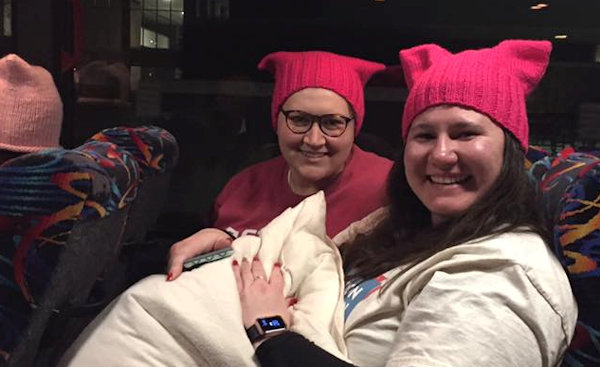Chelsea Williams, a US-2 serving in Detroit, reflects on her participation in the recent Women’s March.
CHELSEA WILLIAMS
Global Mission Fellow
Before you get to my blog that was posted originally on the Book of Fellows (Young Adult Missionaries, United Methodist Church) on February 22nd, I would like to take a minute to say that when writing this post I was speaking only to my experiences with power, privilege, and injustice. I write that as a college-educated, white, Protestant woman there are not many forms of injustice that affect me directly. In saying this I am not attempting to speak for all women who are demographically similar to myself. I don’t believe that my various statuses make me immune to injustice, and I don’t mean to compare injustices that I have faced or may face to injustices that any other woman, whether she holds minority statuses or not, has faced. While I myself have not faced many injustices at this point in my life, I know from many of my friends, some personal experience, people I interact with at my placement site, and knowledge gained through the GMF program that all women are more often than not disadvantaged simply because of our gender, and I don’t want to invalidate the experiences of other women.
A few weeks ago I took part in a protest you may have heard of. Pink hats were involved. A lot of women got together for the day. Some celebrities, musicians, politicians, and other public figures were there too. I’ve spent a lot of the last three weeks collecting my thoughts on this demonstration, and there have been quite a few of them. One idea in particular that I haven’t been able to get out of my head is the privilege at play when I, specifically, participate in a protest.
In the context of going to D.C. for the Women’s March on Washington, I had to be able to pay $75 for a bus ticket. I could manage that. I didn’t have to worry about taking time off of work because I have a job that operates on a more traditional 9-5 work schedule. When I told my supervisor that I was attending the march, I mentioned that I didn’t need to take any time off of work, and she told me that if I had needed to it wouldn’t have been a problem. Not to mention that, if I had missed work, I still would have been paid for that time off, unlike individuals who rely on hourly wage jobs to make ends meet. In addition to this economic privilege, I am able-bodied and don’t have to worry whether or not there will be accommodations that meet my needs. I’m also a white lady who law enforcement isn’t going to automatically profile as “dangerous” or someone to be watched.
I think about the privilege in being able to choose whether or not I take up a cause. As a white, Protestant, college-educated woman coming from a middle-class family, there’s not much injustice or oppression that’s going to affect me directly. It’d be pretty easy for me to ignore the issues facing other groups and continue living a quiet life, not ruffling the feathers of those around me. On the other hand, there are people whose simple existence seems to be an act of protest in societies that do not want to claim them. LGBTQ+ folks, people of color, immigrants, individuals with diverse religious beliefs, abilities, and socio-economic statuses have to fight for causes because that means fighting for their lives and livelihoods.
In her essay, “The Transformation of Silence into Language and Action,” Black feminist and poet, Audre Lorde states, “Your silence will not protect you.” My silence on important issues will not protect me, and it won’t protect others who need advocates and allies. Later in the essay, which I suggest you read, it’s great, Lorde says, “In the cause of silence, each of us draws the face of her own fear – fear of contempt, of censure, or some judgment, or recognition, of challenge, of annihilation.”
Personally, I am not fond of confrontation. I have often held my tongue during conversations as to not heat them up. I can choose to avoid my fear with the use of silence. My fear of an argument, though, is nothing compared to the fear of loss of a job, relationships, potentially of life, that many folks have if they choose to speak out.
My hope, post-Women’s March, is that I stay engaged and continue to ruffle feathers in the interest of all peoples. To quote Audre Lorde one last time, “I am not free while any woman is unfree, even when her shackles are very different from my own.” I can choose to be blissfully ignorant and live my life not engaging with the injustice and forms of oppression all around me. That’s my privilege in action, and I want to be aware of it and wrestle with my decision whenever I choose not to speak out or engage in various protests. Injustice is still injustice whether or not it directly affects me.
~Chelsea Williams is a Global Mission Fellow commissioned by The General Board of Global Ministries. She has served the NOAH Project in Detroit Since August, 2015. Read more about her here.
Last Updated on October 27, 2023

